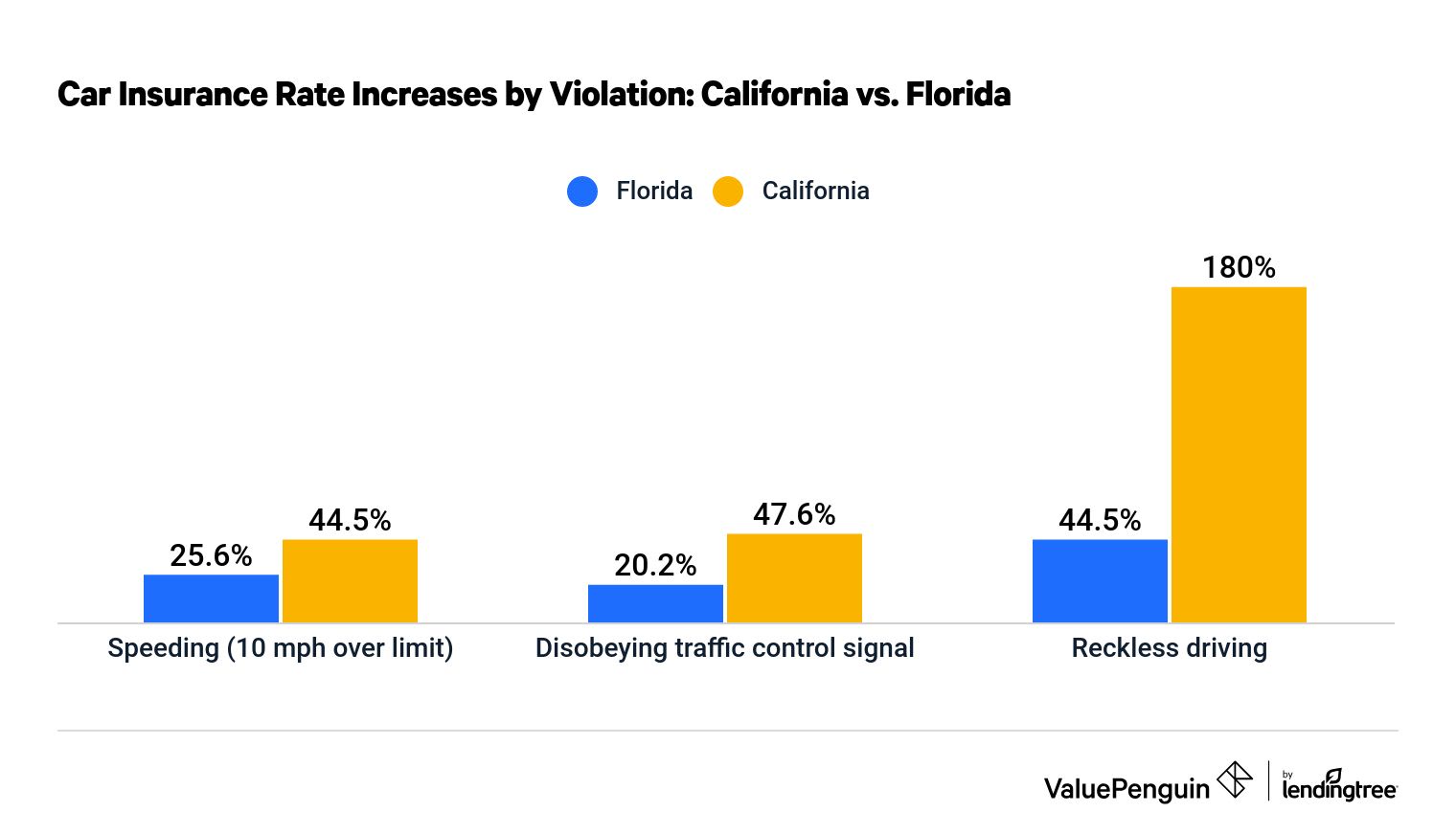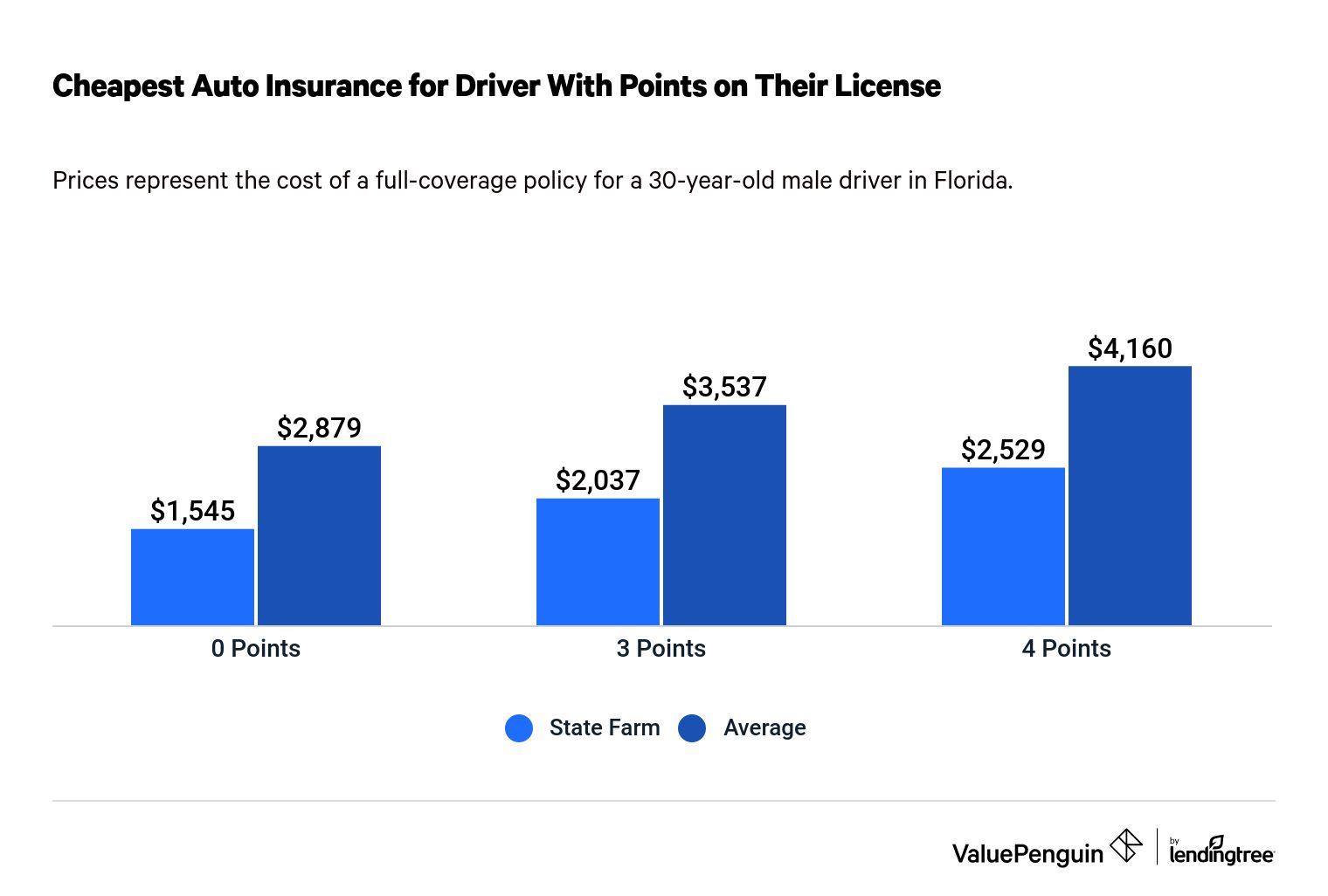Do Drivers License Points Increase Car Insurance Rates?
Getting points on your driver’s license as a result of a traffic violation typically leads to an increase in car insurance costs.
Find Cheap Auto Insurance Quotes in Your Area
Having two points on your driver's license could lead to a 180% increase in auto insurance rates. However, depending on the insurance company, state and violation, points impact insurance rates differently.
Contents
How much do driver's license points affect auto insurance costs?
Getting points on your license almost always results in an increase in auto insurance rates. However, the extent to which rates go up depends on how the insurers weigh the violation, not just the amount of points. For example, in California, disobeying a traffic control signal caused rates to increase 20.2%, while speeding resulted in a 25.6% rate increase, despite the fact that each violation is worth one point on a license.
State | Violation | Insurance cost | # of points | % rate increase |
|---|---|---|---|---|
| Florida | No violation | $2,879 | NA | NA |
| Speeding (10 mph over limit) | $3,616 | 3 points | 25.6% | |
| Disobeying traffic control signal | $3,459 | 4 points | 20.2% | |
| Reckless driving | $4,160 | 4 points | 44.5% | |
| California | No violation | $1,831 | NA | NA |
| Speeding (10 mph over limit) | $2,645 | 1 point | 44.5% | |
| Disobeying traffic control signal | $2,699 | 1 point | 47.6% | |
| Reckless driving | $5,125 | 2 points | 180.0% |
The amount that car insurance costs increase after a violation also varies based on the state. For example, a driver with two points on their license for reckless driving in California saw their insurance costs nearly triple (or a 180% increase), while a driver with the same violation in Florida — despite it being worth four points — only saw their rates increase by 44.5%.

Find Cheap Auto Insurance Quotes in Your Area
Why car insurance is more expensive if you have points on your license
Although there is a correlation between high insurance rates and drivers with several points on their licenses, insurers do not just set rates based on how many points a driver has on their license. Instead, they look at the types of violations the driver has committed to assess how likely it will be for them to have to pay out for a future claim. Thus, violations that indicate a high risk of a future car accident — such as reckless driving — causes insurance rates to increase more than other violations of equal point value.
How license point systems work
In all but 10 states, drivers who are convicted of a moving violation are assigned points on their licenses.
The following states have not implemented a license point system:
For the states that do use points, the number assigned is proportional to the severity of the traffic violation. Minor incidents, such as failing to signal, are worth relatively few points, while more serious infractions — such as drag racing — will add on significantly more. If, during a certain period of time ( typically three years), you accumulate a certain number of points on your license, your license may be suspended.
Drivers who have had their licenses suspended often need their insurer to file an SR-22 form on their behalf to get their driving privileges reinstated. This form verifies that drivers have the minimum state-mandated insurance coverage.
In most states' point systems, the insurers get to independently determine how much to increase rates after a driver is convicted of a traffic violation.
The one exception is North Carolina. There, the state created the Safe Driver Incentive Plan (SDIP), where points on your license increase your insurance rates at a set amount determined by the North Carolina Department of Insurance. Additionally, the SDIP also dictates rate increases for drivers who are proven to be at fault in an accident.
North Carolina SDIP points
Violation / At-fault accident | North Carolina SDIP points | % rate increase |
|---|---|---|
| Speeding (10 mph over limit under 55 mph) | 1 | 40% |
| Following too closely | 2 | 55% |
| At-fault accident causing at least $3,085 in property damage | 3 | 70% |
| Reckless driving | 4 | 90% |
| Driving with a suspended license | 8 | 200% |
| Highway racing | 10 | 260% |
| Drunk driving (BAC of 0.08% or more) | 12 | 340% |
This is not a complete list of violations and accidents that earn SDIP points in North Carolina.
Cheapest auto insurance for drivers with points on their licenses
State Farm typically offers the cheapest car insurance for drivers with points on their licenses. State Farm's insurance quotes for drivers with four points on their licenses are 39% less than average.

Find Cheap Auto Insurance Quotes in Your Area
However, since insurance costs may vary widely based on where you live, the best way to get the cheapest auto insurance rates, if you have points on your license, is to compare quotes from multiple insurance companies in your area. To begin comparing quotes from auto insurance companies near you, enter your ZIP code into our tool above.
How much does insurance increase with 3 points on your license?
In some cases, 3 points on a driver's license can increase car insurance rates by up to 23%, or $658 per year, based on our analysis of multiple violations in Florida.
How much does insurance increase with 4 points on your license?
In Florida, 4 points on a driver's license can increase car insurance rates by as much as 44%, or $1,281 per year.
Methodology
Rates were gathered from ZIP codes across Florida and California. The sample driver was a 30-year-old man with a Honda Civic EX. The policy was for a one-year term and for full coverage.
Data came from Quadrant Information Services, which sources rates from publicly sourced insurer filings. Rates are for comparative purposes only. Your rates will likely differ.
Managing Editor
Ben Breiner is the Managing Editor of ValuePenguin/LendingTree's insurance vertical. He oversees a team of writers who focus on guiding readers through the rigors of home and auto coverage. He still loves that moment when the words fall together and he can translate an intimidating topic so a reader can make the best choice.
Ben got involved in insurance in 2021 when he joined ValuePenguin. He moved up from writer to editor and watched the team grow to expand the ways it helps consumers. Before that, he spent a decade as a sportswriter for newspapers in the Southeast and Midwest.
Ben had to put off buying his first car because of high insurance rates, so he's keenly aware how the wrong policy can get in the way of your goals. He should've shopped around and looked to the experts.
Insurance tip
Always keep an eye out for insurance you can load up on at a low price. A lot more liability coverage won't break the bank and protects your hard-earned assets.
Expertise
- Car insurance
- Home insurance
- Renters insurance
Education
- BA, Economics and Journalism, University of Wisconsin-Madison
Editorial Note: The content of this article is based on the author's opinions and recommendations alone. It has not been previewed, commissioned or otherwise endorsed by any of our network partners.
